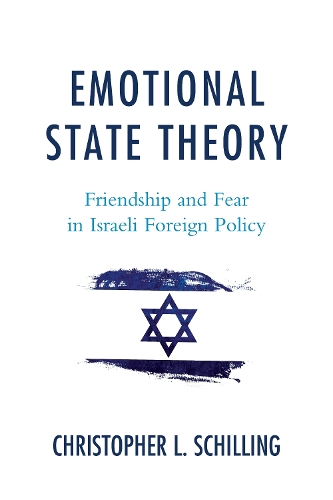
Emotional State Theory: Friendship and Fear in Israeli Foreign Policy
(Hardback)
Publishing Details
Emotional State Theory: Friendship and Fear in Israeli Foreign Policy
By (Author) Christopher L. Schilling
Bloomsbury Publishing PLC
Lexington Books
11th December 2014
United States
Classifications
Professional and Scholarly
Non Fiction
Central / national / federal government policies
Cultural studies
327.5694
Physical Properties
Hardback
152
Width 161mm, Height 236mm, Spine 17mm
367g
Description
This book develops emotional state theory as a new contribution to international relations theory (IR). The text addresses the State of Israel vis--vis the rest of the world. The rationale for this research perspective stems from the trajectory of Israeli state-building since its foundation in May 1948 to the present date. This trajectory is constructed reflecting the trauma of the past and dreams about the future. Both contribute decisively to a better understanding of the current image and position of the state of Israel. The reference builds on two great Jewish thinkers works, Theodor Herzl and his book The Jewish State and Sigmund Freud's The Interpretation of Dreams. The author argues that despite the fact that both never met, taken together their ideas lend themselves to shed light on and offer an explanation for Israels troubled and uncertain position in current international relations. The resulting question underlying this work on the emotionality of states and its impact on international relations is therefore whether Israel is still in a process of dreaming and whether it is therefore to be understood a state which has not yet woken from the trauma of the Jewish past. Not a dreams fulfilment of an end of the Diaspora, but a nightmare based on this experience. Drawing on these two parallel and rather influential texts, Schilling rephrases the leading questions of this book as this: Has Israel developed an understanding of itself which sees the country as a modern state among the nations, which is dealing with its neighbors, or rather, does Israel understand itself more as being like a ghetto that is still surrounded by a hostile world Has Israel become a strong, self-confident country, or has it continued with the nervousness of the Diaspora Jews to become a state with an emotional problem.
Reviews
Schillings theory of Israels emotional state is credible. It is backed by psychological and political evidence, and his research and explanations are very thorough. Schillings writing is exemplary. The book is easy to read, and his framework is easy to follow. . . .In this book, Schilling helps to foster an understanding of Israel which is especially helpful today as Israel figures so prominently in world affairs. * International Social Science Review *
Schillings research does contain insights that provide food for thought on some of the undercurrents affecting Israels foreign policy. In summary, Schillings book provides an interesting analysis of a number of themes that have left their mark on Israeli foreign policy. . . .The books main contributionis in providing analysis on these themes from a therapeutic, and therefore constructiveif not to say constructivistpoint of view. One need not be inclined to see this framework as a full-fledged theory in order to accept the value of Schillings insights. Insofar as critical introspection is valuable for any state wishing to advance, refine, and calibrate its foreign policy to align optimally with its national interests, the points raised by Schillings exercise in emotional therapy are useful and thought provoking. * Israel Journal of Foreign Affairs *
The analysis of emotions is a most powerful tool to understand the foreign policy of states. In this book, Christopher L. Schilling presents an original study of Israeli foreign policy with tremendous implication to the study of international relations. Emotional State Theory is highly readable, informative, and thought-provoking. Schilling's work will contribute in significant ways to our understanding of the emotional being of states such as Israel. The argument the book presents is based on the fascinating analysis of two predominant emotionsfear and anxiety. -- Mara Carolina Agoff, Centro Regional de Investigaciones Multidisciplinarias-UNAM
Author Bio
Christopher L. Schilling is political scientist and lawyer.
